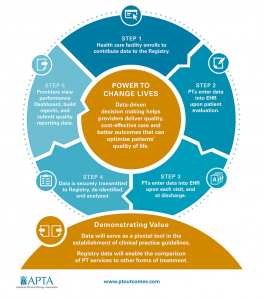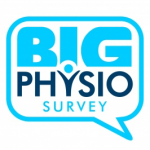“Data from the profession, for the profession.” That is the slogan for the new Physical Therapy Outcomes Registry recently launched by the APTA. Although similar IT solutions exist this project is one of the biggest of its kind. With the aim of collecting and analysing patient outcome data from practices throughout America this is certainly true. But what will be the benefit to the service user and will it be a nuisance to therapists?
The registry has been designed to connect to third party electronic patient record systems to allow ease of use for clinicians. Essentially, once integrated with your record system, you will not need to do any additional data entry to link to the registry. It will do it all for you.
 Outcome measures for each patient can be updated and reviewed at any time allowing visualisation of patient progress over time. This could, for example, allow more appropriate alteration of treatment plans in a timely fashion.
Outcome measures for each patient can be updated and reviewed at any time allowing visualisation of patient progress over time. This could, for example, allow more appropriate alteration of treatment plans in a timely fashion.
The data could be analysed from the perspective of practice performance allowing bench marking against other services so as to highlight areas in need of improvement. This will also allow a more informed patient choice between two practices.
The data collected could enable improved care, streamlined marketing, improved research base and a contribution to national level professional guidelines. It could also lead towards a performance based reimbursement structure enabling more value for money for the service users.
The shear volume of data collected could be of great benefit to researchers and policymakers alike. The demographic, intervention choice and outcome data for certain populations could be used in analysis describing patterns of variance in treatment and outcomes on a huge scale. In turn this could lead to new risk-adjusted models of care for certain conditions in differing groups of patients. This is directly comparable to the aims of the big physio survey and its scope of drawing conclusions from the wealth of data available.
As the registry is in its infancy, there will be a limited number of outcome measures used to start with but they will certainly expand to incorporate specialties away from musculoskeletal conditions.
With both service users and service providers set to benefit from using the registry it should definitely grow rapidly. Let’s hope it does because Physiotherapy has a tendency to be behind the times with technology trends. Is it time for a physiotherapy technology revolution?
Physiotherapy is certainly beginning to embrace the concept of big data which could lead to an exciting future for the profession. What do you think of databases like this? Let us know.